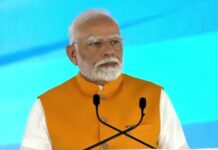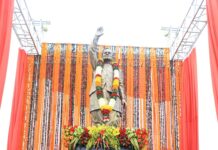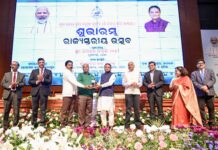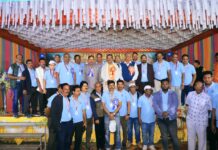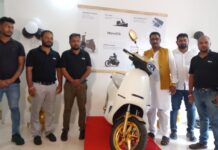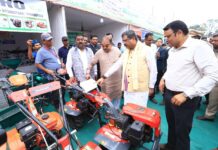By Our Correspondent
PARADIP/BHUBANESWAR: The Sajjan Jindal led JSW Utkal Steel will face tough time more with locals gearing up for a massive protest during company’s public hearing on December 20, Friday.
Sources said that the public hearing will be held at Gadakujanga in Jagatsinghpur district. Locals have opposed the JSW Steel officials, those who arrived in Paradip for public hearing.
Officials visited the proposed project site at Gadakujanga and Nuagaon villages on Wednesday and held direct interaction with locals. The visiting JSW officials included Deputy Managing Director Binod Goyel, Odisha head Ranjan Das, Vice President Satya Kumar Mallick, Human Resources Officer Subash Parida, Zilla Parishad Member Itishree Bhuyan. Pro- industry leaders Tamil Pradhan, Rajendra Behera, Narayan Chandra Jena and many others were present.
On the other hand, the anti-project groups have started their home works holding meetings in Dhinkia, Nuagaon and Balitutha Panchayats. They have decided to oppose the JSW project citing it will jeopardise their livelihoods and create serious environmental hazards. They demand immediate cancellation of the JSW public hearing scheduled for December 20.
Meanwhile, the studied rivalry, sometimes coming to fore, between India’s two major Corporate Houses ArcelorMittal- JSW Steel , may delay Odisha’s ongoing already delayed mining auction for more times.
The Nuagaon Iron Ore Block under Joda mining circle of Odisha’s Keonjhar district, which has proven Iron Ore deposit of 792 million tonnes, spread over 767 hectares is the focal point. The block was earlier held by Kamaljit Singh Ahluwalia and his brother Prashant Ahluwalia of KJS Ahluwalia Group and Kapyee Enterprises.
The Odisha Government had on December 6 again issued a fresh NIT (Notice Inviting Tender) for auction of as many as 20 mining blocks including 12 Iron Ore, 2 Manganese and 6 Iron & Manganese blocks.
Sources keeping a close watch on the top corporate battle for getting a major iron-ore block in Odisha’s mineral rich Keonjhar and Sundargarh however said, the tussle is now open , which also put Naveen Patnaik led BJD Government in the State in hurry as well as Dharmendra Pradhan led Steel Ministry.“If mining auction gets delay, it will directly hit Steel production in the Country,” said a top Odisha Government official in Bhubaneswar.
Though JSW Steel is the largest steelmaker in India, it still lags Tata Steel when it comes to margins. That is thanks to the considerable deposits of iron ore that Tata Steel has in its captive mines. These mines in Odisha and Jharkhand meet all the iron ore requirements of Tata Steel and about 30 percent of its coal needs. Iron ore and coal are used as raw materials in steel making.
JSW Steel, on the other hand, has historically depended on the market for its raw material supplies. It has had small victories in recent times, having won rights to mines in Karnataka. But these are small — with reserves of 93 million tonne and annual production of about 7.5 MT — meeting about 35 percent of its needs.The mines in Odisha, on the other hand, will have reserves of nearly 600 MT.
Having own mines makes sense especially during an economic slowdown, like the present one. And this year’s slowdown was marked by low steel prices, but high rates of iron ore and coal, a situation that harms margins even more.
Mines are like a lifeline for the bottomline. To become the market leader, mines are the only way.This is the same reason that is driving ArcelorMittal and why it hopes to close the Essar Steel acquisition by 2019-end.
Essar Steel, which has its manufacturing facility in Gujarat’s Hazira, doesn’t have a mine. But it does have access to Odisha Slurry Pipeline Infrastructure (OSPL), which supplies iron ore to Essar Steel’s pellet plant in Odisha. The pellets are then taken to Hazira to be used in Essar Steel’s plants.
While ArcelorMittal has emerged as the highest bidder for OSPL, it will want more mines under its kitty, to bring down the manufacturing cost at Essar Steel. Globally, it has a large mining operations with annual production of nearly 60 MT of iron ore and about 5 MT of coking coal.
For sure, ArcelorMittal will want to bring all that prowess on the table, as it vies for the mines. JSW Steel, on the other hand, would want to maintain an upper hand in the Indian market.
The studied silence and undue favour shown to Sajjan Jindal led JSW Utkal Steel Ltd in Odisha has raised many eyebrows with Odisha Government cancelling the ongoing bidding of 20 running mines expiring by March 30, 2020. Sources said, JSW Steel has submitted multiple bids through its subsidiaries for a few key mineral blocks on offer.
Among the first lot was the massive 767.284 ha Nuagaon deposit with reserves of 792.93 million tonne, larger than all other iron ore deposits on offer A net worth criterion of Rs 3872 crore had disqualified the incumbent lessee KJS Ahluwalia.
Of the fifteen technical bids received for Nuagaon, six were from companies or subsidiaries of the Sajjan Jindal led JSW Group – JSW Steel, JSW Raigarh, JSW Bengal Steel, JSW Jharkhand Steel, JSW Utkal Steel, and Amba River Coke.Elder brother Prithvi Raj Jindal’s Jindal SAW and younger brother Naveen Jindal’s Jindal Steel and PowerNSE -0.96 % and its subsidiary, Jindal Power, are also in the run.
Among the 20 mining blocks was the massive 767.284 ha Nuagaon deposit with reserves of 792.93 million tonne, larger than all other iron ore deposits on offer.Sources said the state government has received 15 technical bids for the Nuagaon block of which six were from companies or subsidiaries of a particular steel major, sources further said.
The fresh notification for auction of 20 mines would be issued December 6, while the technical bid will be opened January 4 2020 next year, added the source. Letters of intent earlier expected to be granted to the highest bidder by January 2020 will now be signed in February next year.
“We have cancelled the bidding process and fresh tenders will be invited again,” said an official of Odisha Steel and Mines Department. It may be noted here that, the JSW Steel is facing local resistance in Odisha.
Sources said, JSW Utkal Steel, which is planning a mega steel plant at Paradip in Jagatsinghpur district, where South Korean, POSCO failed, eyeing big mines in Odisha. The decision was taken after Adani group and ArcelorMittal, who participated in the first of two rounds of auctions, complained against JSW’s decision to bid for the largest block through half a dozen subsidiaries.
“Several companies including Adani Group- ArcelorMittal objected the practice, prompting the department to cancel the notice inviting tenders (NITs) for all the 20 working mines.
The Naveen Patnaik Government after the new mines and minerals acts, has made it open that a company or its subsidiary can submit only one bid for a particular mineral block.
It seems, the fate of mega Steel projects in Odisha’s coastal districts of Jagatsinghpur , which houses Paradip Port, looks not lucrative with one after another Mega Steel Companies facing resistance either from locals or from social and environmental activists.
After South Korean Steel major POSCO exit from Odisha, JSW Utkal Steel Ltd, of JSW Steel Group of Sajjan Jindal is eyeing the POSCO slot in Jagatsinghpur but things look not easy with several leading activists announcing in Bhubaneswar to oppose the JSW Utkal Steel Ltd projects.
Lok Shakti Abhijan Convenor Prafulla Samantara and former CPI MLA Radhakant Sethi had alleged that the new steel plant project is more dangerous than Posco.
“The proposed project is a 13 million ton per year steel plant along with cement, cold and hot rolled mills and 900-MW power plant. Each is a pollutant unit. There will be huge cumulative effect on environment and the pollution will invade air, agriculture land as well as water bodies,” they had said.
This will have also a port at Jatadhari which will be harmful to agricultural land and fisher community. The cumulative pollution will spread more than 20 km radius for which more than 50,000 villagers of nearby villages will be affected and deprived of livelihood,” they had alleged.
On the contrary, they demanded a proper environment impact assessment report for the new project and discarded the one already done, what they said to be lacking facts.
They said that after POSCO left its project, the forced acquired land has to be returned to the farmers as per the Land Acquisition Act, 2013. Similarly, the people who opposed POSCO are still facing false charges slapped by police. When the old issues are yet to be settled, another plant is imposed on the people of the locality. It is neither desirable nor necessary, they told.
They warned that there will be intensive protest and the people won’t allow the project to take off.They also alleged that since the district Collector is a local person, he is using his personal connections to favour the company and demanded that he should be transferred.
Sources said, even as JSW Steel cut its capex guidance for FY20, the company is looking at bidding for a majority of the 20 iron ore mines in Odisha to secure raw material for its greenfield and brownfield projects.
Sources also said the company was bidding for mines given the 20 mtpa greenfield project in Odisha. “The mines in Odisha will primarily help the company secure the future raw material needs of the new plant in Odisha, but it will be taken to other plants as well to meet the requirement,” he added.
According to sources close to the development, the Odisha tender has a reserve price or premium requirement of 15-50% depending on the resources available at the mines. This would mean the miner will have to pay the government between 15-50% of the price per tonne of iron ore as premium. The cost of iron ore in Odisha ranges between Rs 2,000 per tonne to Rs 6,000 per tonne depending on the grade.
The Odisha mines would be viable for JSW Steel in the long term only if it is used for greenfield plant near the mines. Otherwise, the landed cost would be higher compared with the iron ore available in Karnataka where JSW Steel plants are located. The ore is available at `3,000 per tonne to Rs 4,000 per tonne in Karnataka with an additional `500/tonne for transportation. It is better to import a higher grade iron ore from abroad for `6,500 per tonne than to import from the east coast of India to the west coast, sources said.
The steel ministry has planned a target of 300 mtpa of steel capacity by 2030 from 100 mtpa at present that would require additional iron ore mining leases in coming years. The Federation of Indian Minerals Industry said India is set to auction 48 mining leases of independent miners before March 31, 2020, which will be effective for 50 years.
The federation has, however, expressed concern over the delay in auctions of mining leases that are due to expire in March. It believes that the delays could disrupt India’s iron ore production and raise the prospect of higher imports.
Even Citigroup had forecast that the country could become a net importer of 25 million to 30 million tonne of iron ore as the expiry of mining leases threaten to disrupt nearly a quarter of India’s output. This would be highest in records since 2009.
Odisha produced around 120MT iron ore in FY19, or more than half the national production and as per NEERI, this can go up to over 180MT annually.
The expert also said there is a huge bottleneck in transporting iron ore from Odisha mines to end-use plants or ports due to restriction on transportation timing, non- availability of rakes, and the scarcity of railway sidings.
After Lok Shakti Abhijan convenor Prafulla Samantray and former CPI MLA Radhakanta Sethi, Supreme Court lawyer and All India Congress Committee (AICC) Legal and Human Rights Cell Odisha coordinator Susant Kumar Kanungo had opposed the proposed JSW project in Erasama block in Jagatsinghpur district.
Kanungo has petitioned Chief Minister Naveen Patnaik seeking fulfillment of 10-point charter of demands before the proposed project’s public hearing scheduled to be held on November 22.
In the petition Kanungo stated that the project is proposed to come up on land which was previously acquired for the Posco project. After South Korean steel major relinquished its proposed project, the acquired land was brought under land bank scheme of the State Government.
According to the rules if no project is set up in the acquisitioned land within five years, the land should be returned to the land owners.But violating the rules, the State Government has transferred the same land to the JSW Utkal Steel Limited, which is unsustainable in the eyes of the law, the petitioner alleged.
Local residents of Dhinkia, Govindapur, Nuagaon and Balitutha areas in the district have decided to oppose the JSW project claiming that it would jeopardise their livelihoods, and trigger serious environmental degradation. The locals have demanded immediate cancellation of the company’s public hearing scheduled to be held on November 22, stated Kanungo.


